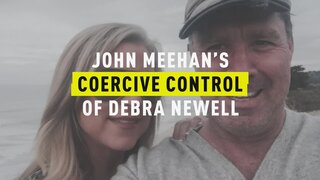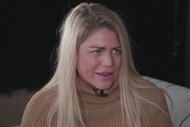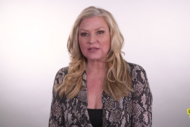Create a free profile to get unlimited access to exclusive videos, breaking news, sweepstakes, and more!
Why Debra Newell Stayed With 'Dirty John': The Insidious Form Of Abuse We Rarely Talk About
John Meehan was an expert at coercive control, a form of abuse that relies on manipulation and exploitation to quietly gain “utter domination” and control over someone’s life.

John Meehan was seemingly the perfect partner. The handsome, charismatic self-proclaimed doctor happily ran countless errands for Debra Newell, constantly praising her for her beauty and abilities. He was her confidant and biggest supporter, making her feel secure and loved during their whirlwind courtship.
But the same traits that made Meehan appear to be such an enviable partner were in reality calculated and skilled maneuvers to gain control over her life and manipulate her every vulnerability through the use of coercive control.
So what exactly is coercive control? This dangerous form of abuse relies on a range of behaviors or actions to exploit and dominate an intended victim, ultimately depriving them of their most basic rights and needs, according to Laura Richards, a criminal behavioral analyst who once ran the Homicide Prevention Unit for the New Scotland Yard and also spearheaded a law criminalizing coercive control in England and Wales.
“The behaviors can be very different because it depends on the victim,” Richards told Oxygen.com. “It’s very idiosyncratic to them and tailor-made as a plan to target them.”
These behaviors can include strategies like using pseudo-caring tactics that appear to be attentive and thoughtful, while in reality the perpetrator is actually just storing up information about the intended victim or creating an atmosphere of codependence.
“When we understand coercive control, it’s really about utter domination,” explained Richards.
She pointed to Meehan’s charming and charismatic personality that almost appeared “too good to be true” as one of his most powerful weapons.
“He wore a mask of one thing, but actually what was going on behind the scenes was that he was attentive to her because he was trying to get as much information about her as possible,” Richards said of his relationship with Newell. “He filled in all the gaps in her life, so he enhanced her life. And what she understood was that he was doing all these jobs and things to highlight and lift her up to the highest potential, but actually, he was doing all these things to create codependency.”
Little by little, Meehan was gaining more information about Newell’s banking accounts, work habits, family dynamics, past romantic relationships, and insecurities.
Meehan used the information he gained to mold himself into the perfect partner for Newell, portraying himself as a successful, religious doctor who valued his family, while in reality he was an ex-convict with a drug habit who had never been a medical doctor.
“He socially engineers things, so he understands her likes and dislikes and he matches them,” Richards said. “These are intelligent and smart women. But unfortunately for them, they don’t understand the tactics that he’s using are not real, bonafide feelings.”
Using flattery and charm, perpetrators of coercive control often love bomb their victims, creating an “intoxicating” feeling of love that pulls their victims in and gives them a false sense of security.
“It was never just one thing that he did, and he was very sophisticated at this brainwashing of Debra,” Richards said. “You’re talking about a grown adult female that is being almost undone psychologically so that they lose their sense of self, what they love, what they like doing, their very essence of being.”
Early in the relationship, he also began to isolate Newell in “subtle” and “nuanced” ways away from her daughters and other family members, by planting seeds of doubt about the motives and intentions of those closest to her.
“When you're looking to control someone, you don't want daughters and sisters and mothers and people interfering in the relationship. And therefore, in most of these cases you see isolation,” Richards said.
Newell told Oxygen.com she began to see Meehan was controlling her “little by little” as he put cameras in their home, wanted to drive her to job sites, insisted on going to the doctor with her, and ran most of her regular errands.
“At first you think, ‘Wow, this man just really cares about me,’ but what’s really happening is he’s trying to control me,” she said.
While some have questioned why Newell returned to Meehan after her first attempt to leave the relationship, Richards said the dynamics of a relationship centered on coercive control can be complex.
On average, she said, it takes a woman seven times before they successfully leave an abuser.
“We have to understand that when someone falls in love, there’s an emotional investment, even if it’s with the love feeling itself. And so, for Debra, she understood that 95 percent of his behavior was bad, but there was this five percent that he could bargain and get leverage on,” Richards said.
That five percent included thoughts about not wanting to be alone, wanting to feel needed, and respecting the path she believed God had put her on, Richards explained.
“We believe what we want to believe. And sometimes we negate the things that we know in our gut are the right things,” she said.
Newell herself said her decision to return to the relationship was based on a variety of things, including the commitment she had made during their marriage vows.
“I didn’t know how dangerous he was, to be honest with you,” she said. “You also just don’t walk away.”
Meehan had also continued to manipulate her, telling her that he was innocent of many of the things he had been accused of. He told Newell he wanted to hire a lawyer to clear his name and set the record straight.
“We did go to the lawyer prior to him moving back and the lawyer did state that John was the victim, that he was innocent and some of these things,” she said.
Newell was also weighing advice at the time from a lawyer, private investigator, counselor, and psychologist, Richards noted, who instructed Newell that when she was ready to leave she needed to be strategic about her departure.
“I think so many people sat in judgement about Debra. And we have to remember that the decisions and the choices that she took kept her and her daughters alive,” she said.
Coercive control and stalking often lead to fatal confrontations that are more likely to occur in the immediate months after someone has left a relationship. “The time someone leaves is the highest risk time. 76 percent of the murders happen on separation and roughly 80 percent happen within the first four months of separation,” Richards said.
Newell made the decision to break away from the relationship, she said, after she learned that Meehan had not been the victim like he claimed.
When she left, she wore wigs to disguise her identity, used her assistant’s name when checking into hotels, used money she had been secretly withdrawing from her paycheck, and rented different cars all as part of her elaborate safety planning.
“She knew that if he found her, he would probably kill her,” Richards said. “And therefore…the information that she took from experts and put into practice are the very things that kept her alive.”
Newell's story inspired both the "Dirty John" podcast and a show on Bravo with the same name that tells a dramatized version of the events. As their popularity has grown, Newell has found herself thrust into the spotlight and has become an advocate against domestic abuse.
She and Richards have joined together to increase awareness about the power of coercive control and the dangers it can present.
In addition to Newell's own experience, her mission to increase awareness about abuse has also been driven by the fatal shooting of her sister, Cindi Vickers, in 1984. Vickers was shot and killed by her husband, Billy Vickers, shortly after the two had separated. Newell now believes coercive control played a role in her death.
“I didn’t feel that my sister ever had a voice in this,” Newell said. “She didn’t get to see her children raised. She didn’t get to fulfill her dreams. She didn’t get to see her grandkids.”
Newell decided to share her story and is speaking out about coercive control to make sure the voices of survivors of abuse are no longer silent.
“I want women to know they're not alone and they shouldn't be ashamed,’ she said. “This could happen to anyone.”
Oxygen Media's two-hour documentary on John Meehan, "Dirty John, The Dirty Truth," airs Monday, January 14 at 8/9c on Oxygen.
[Photo: Terra Newell and Debra Newell on in January on "Megyn Kelly Today;" via Getty Images]




























